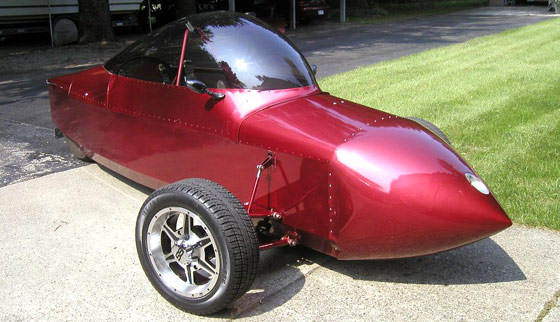
Recently we have been seeing a lot more 3-wheelers than we used to. The Automotive X-Prize competition is full of them, with teams hoping to take advantage of the improved aerodynamics and reduced rolling resistance of 3-wheeled vehicles. While many of these vehicles end up looking like space-age ships (ahem, Aptera) or land rockets, the design principles are sound, and can even be cool.
Just take a look at this recent article by Popular Mechanics that looks at some of the historically cool 3-wheelers out there. Despite being around since the beginnings of the car and motorcycle, these vehicles never really took off. I can see 3 good reasons why that is about to change:
- Fuel efficiency: 3-wheeled designs have greater possibility for fuel efficiency, which is going to be a must as we transition away from gasoline and toward alternatives like batteries or hydrogen.
- Speed: 3-wheelers tend to be fast, very fast. Like motorcycles, often much faster than cars. However, they are safer than motorcycles and offer a more conventional drive for the everyday driver/commuter.
- Fun: For most drivers, the biggest difference in a vehicle’s “fun factor” is how well it handles. While the suspension on the average land boat may be getting better, they will likely never rival the sporty feeling you get behind the wheel of a trike.
I, for one, welcome our 3-wheeled friends to share the streets with us any time!
Popularity: 4% [?]




{ 5 comments }
I would agree about the economy, and the fun factor, but since I own a JZR (which I love) I think I should point out a few shortcomings. While more folks in four wheelers are worried about the tipping point, my three wheeler is almost as stable as my ’73 Mini (which is to say, like a go kart with a body). However, there are limits to adhesion, and since a lot of the more modern 3 wheelers have wider tires, I suspect the vehicle will flip before the front end breaks loose. The biggest problem with three wheels though is one wheel drive. Hit a wet or loose patch in the road (worse through a corner), and things get squirrely quickly. Also, while it might be a minor point, there’s no pothole/ road debris avoidance in a three wheeled car. The other issue is size. While my vehicle is intended to be a replica of a Morgan from the ’30s (basically a cyclecar), even the Aptera is sort of tight for two large people. Suspension issues get worse with weight. That said, there’s nothing quite as exhilarating as the lightness that three wheels offers winding down a country road.
Thanks for the comment Bill. Thanks also for pointing out the size issue, that was one thing I hadnt thought of myself 🙂
A problem which popped up for me is financing. I have several 3-wheelers: a microcar, a velomobile, a recumbent trike. Before local financial problems I financed the microcar easily, but a 3-wheeler just arrived for sale in the US. After reconsidering the missing wheel, my financial institution avoids my “eco-compassion” for 3-wheelers!
Hi,
The Aptera has front wheel drive, so traction and regenerative braking are greatly improved. And the changes to the door windows (to make them roll down) will improve the space issues; though I have heard from folks who are 6′-5″ who easily fit into the current 2e.
The stability comes at the expense of overall width — the Aptera is wide — they are aiming to get the outside of the front wheel fairings to be 7′ out-to-out, and I think this will be less of an issue than many people fear, but it is fairly wide.
Sincerely, Neil
Since you brought up safety, I have to point out that safety is mostly driver dependent, and that someone who chooses to work on their skills may have a better time avoiding accidents in a narrower vehicle, and still avoid falling over when standing still. Having a whole lane of traffic to yourself gives you a lot of room to negotiate with two wheels.
Whereas wrapping people in high speed cages makes them less invested in avoiding collisions and their minds wander off to things like texting.
I don’t have a problem with 3 wheelers per-se, just don’t think there is any basis for safety comparisons without a laundry list of assumptions, which a lot of experienced two wheelers would not agree with, and which prevents many people from ever considering an even more efficient form.
Comments on this entry are closed.